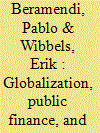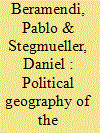| Srl | Item |
| 1 |
ID:
145718


|
|
|
| 2 |
ID:
080049


|
|
|
|
|
| Publication |
2007.
|
| Summary/Abstract |
A long tradition of research has shown decentralized political structures as an important cause behind lower levels of redistribution and higher levels of inequality. This article offers an alternative interpretation of the association between fragmented fiscal structures and higher levels of inequality. I argue that the distributive effects of decentralization depend on the preexisting territorial patterns of inequality. Therefore, the political choice between alternative fiscal structures is largely driven by their expected distributive consequences. As a result, the territorial structure of inequality becomes an important factor to explain why some fiscal structures are more integrated than others. Two mechanisms link regional income distributions and preferences about the decentralization of redistributive policy: differences in the demand for redistribution associated with interregional income differences, and differences in the demand for social insurance associated with the incidence of labor market risks. I test the argument using a data set of fourteen countries in the Organization for Economic Cooperation and Development (OECD) over the period 1980-2000. In addition, I illustrate the potential of the approach by analyzing why social solidarity remains territorially fragmented in the European Union despite the fact that it has a common currency and a common market
|
|
|
|
|
|
|
|
|
|
|
|
|
|
|
|
| 3 |
ID:
174768


|
|
|
|
|
| Summary/Abstract |
The European Union provided a mixed response to the 2008 financial crisis. On the one hand, it refused to pursue fiscal integration through a common budget; on the other, it introduced significant transfers between countries that were designed to produce financial stabilization. The authors analyze this response as the outcome of democratic constraints on EU leaders. Given the EU’s current institutional structure, citizens’ preferences pose a binding constraint on what leaders can do as these preferences limit the scope of risk-pooling among members and the degree of political tolerance for different courses of action. The authors show that citizens’ preferences reflect differences in the geography of income, production regimes, and institutional organization. The heterogeneity of constituencies’ redistribution preferences combined with a diverse economic geography helps to explain why political constraints on national governments prevent them from engaging in further fiscal integration. By contrast, externalities among member states shift the preferences of citizens who may experience negative effects and make international redistribution politically feasible. The authors analyze these two mechanisms and present novel empirical results on the determinants of preferences for fiscal integration and international redistribution in the aftermath of the eurocrisis.
|
|
|
|
|
|
|
|
|
|
|
|
|
|
|
|